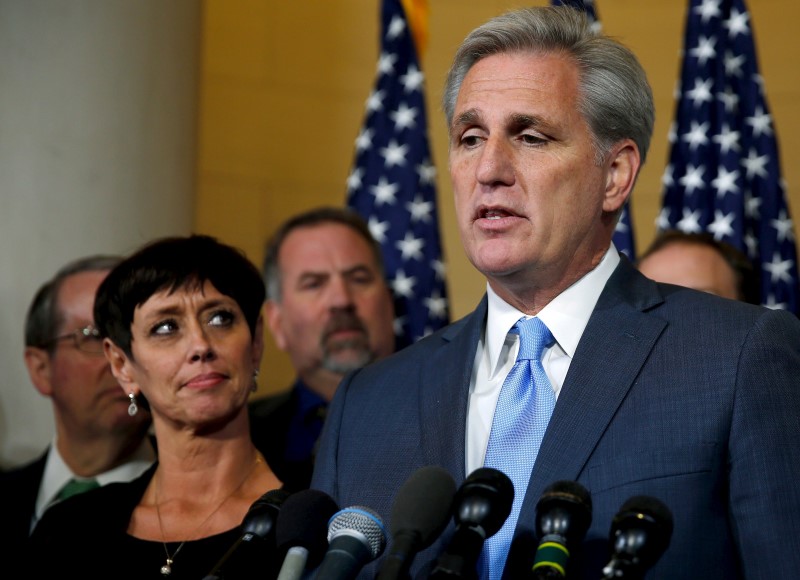By Susan Cornwell and Andy Sullivan
WASHINGTON (Reuters) - Republicans in Washington struggled to fill a leadership void on Thursday as the front-runner to take control of the House of Representatives, Kevin McCarthy, quit the race in a surprise announcement that heightened concerns about the party's ability to govern effectively.
Representative McCarthy, the No. 2 House Republican, had been expected to win Thursday's contest for the nomination to succeed retiring Speaker John Boehner despite opposition from more conservative lawmakers demanding a harder line against Democratic President Barack Obama's agenda.
But McCarthy stunned colleagues by bowing out before the vote, saying he was still short of the support needed to be an effective speaker.
"For us to unite, we probably need a fresh face," McCarthy, who is from California, told reporters after the election meeting ended in chaos. He said he would remain majority leader, a post he has held since August 2014.
House Republicans scrambled to identify a replacement who could bridge their divisions. A move to draft House Ways and Means Committee Chairman Paul Ryan had made no headway as of the end of the day.
Ryan, Republicans' leading voice on fiscal matters and their 2012 vice presidential candidate, said shortly after McCarthy's announcement that he would not run for speaker. But Republican lawmakers later said they were still urging him on.
"My statement stands. I haven't changed anything," Ryan later told reporters in the Capitol. "I've got nothing to add right now."
Boehner, who planned to retire from Congress on Oct. 30, said he would stay on the job as speaker until a replacement is elected. It was not clear whether an Oct. 29 vote for speaker in the full House would still take place.
Under the leadership of Boehner, an Ohio Republican who relied on McCarthy as an ally, Republicans stumbled into a 16-day government shutdown in 2013 and waged a debt-limit standoff with Obama that brought the country to the brink of default in 2011, leading to the United States' first-ever debt rating downgrade.
Congress faces another deadline to lift the debt limit on Nov. 5 and another potential shutdown threat in December.
The next speaker will have to navigate some of these issues while answering to a newly assertive conservative wing at a time when the party is trying to show voters they can govern effectively ahead of the November 2016 presidential elections.
In several closed-door meetings this week, McCarthy told Republican lawmakers he would run the House in a more inclusive manner than Boehner had.
But he failed to convince the 40 or so members of the House Freedom Caucus, a group aligned with the Tea Party movement that calls for lower taxes, less federal spending and reduction of the national debt and federal budget deficit.
The caucus decided to back a rival of McCarthy, Representative Daniel Webster of Florida.
McCarthy also faced criticism for suggesting last week that a congressional probe of the 2012 attacks in Benghazi, Libya, was designed to hurt Democratic presidential candidate Hillary Clinton. Clinton was secretary of state at the time of the attack, which killed four Americans.
House Republicans' inability to merely pick a leader comes after Boehner and Senate Majority Leader Mitch McConnell, also a Republican, had gone to great lengths to demonstrate that their party can effectively run Congress and should be trusted with the White House in 2017.
The two lawmakers who had challenged McCarthy for the post, Webster and Representative Jason Chaffetz of Utah, said they were still in the race and others likely will enter.
"It was just absolutely stunning what happened," Chaffetz said.
Republican Representative Walter Jones earlier this week asked the speaker candidates to step aside if they had committed any personal "misdeeds" that could embarrass the party, without naming any specific concerns.
Asked whether that request was a factor in his decision to quit the race, McCarthy, flanked by his wife and children, said, "No. Come on."
White House spokesman Josh Earnest urged Republicans to raise the debt ceiling promptly. He said "there's been a rupture in the Republican Party" between moderates and a vocal conservative minority.
"It does threaten their ability to make a strong case to the American public that they have what it takes to govern the country," Earnest said at a news briefing.
Senator John McCain, the 2008 Republican presidential candidate, warned that his party must put an end to the turmoil or risk voter backlash next year.

"If this turmoil continues I can surely understand why people would wonder what's going on in the Republican Party," McCain told MSNBC.